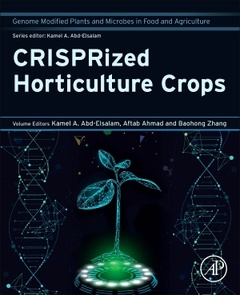CRISPRized Horticulture Crops Genome Modified Plants and Microbes in Food and Agriculture
Coordonnateurs : A Abd-Elsalam Kamel, Ahmad Aftab, Zhang Baohong

CRISPRized Horticultural Crops: Genome Modified Plants and Microbes in Food and Agriculture summarizes applications of CRISPR/Cas systems and its advanced variants e.g., CRISPR/Cpf1, base editing and prime editing, for precise editing of horticultural crops. The book discusses vector transformations methods, epi-genome, deep learning, synthetic biology, and precision breeding for improving yield and quality related attributes in horticultural crops. With coverage of the relevant technologies and their applications, the book also includes bioinformatics and large-scale databases and their potential application in fruits, vegetables and ornamental plants and sections on regulatory concerns related to CRISPR edited crops.
Horticultural crops, including fruit, vegetable and ornamental plants are an important component of agriculture production systems and play an important role in sustaining human life.
Part 1: The CRISPR/Cas toolkit for Horticultural Crops 1. Horticultural Crops: Genomic Approaches: A note from Editors 2. Evolution of genome editing technologies 3. CRISPR / Cas: Effectors, mechanism, and classification 4. Bioinformatics tools and databases in genome editing for plants 5. Genome editing reagents and their delivery tools 6. CRISPR Techniques and their applications in plants 7. Base editing and Prime Editing in Horticulture Crops: Potential Applications, Challenges and Prospects 8. Multiplex Genome Editing in plants through CRISPR/Cas 9. CRISPR Edited Crops: The Future of Food and environment Sustainability
Part 2: CRISPR Mediated Genome Editing in Horticultural Crops 10. The CRISPRized Horticultural Crops: How they can transform our food supply 11. Precision breeding techniques for horticultural crops 12. Deep learning for genomics and epi-genomics in horticulture crops improvement 13. Transformation methods in horticulture crops and DNA free genome editing in plants 14. CRISPR vegetables: Challenges and opportunities 15. CRISPR–Cas9-mediated genome editing in tomato, and Potato 16. A CRISPR/Cas Based Improvement of Root and Tuber crops 17. Improvement of ornamental?plants through CRISPR/Cas 18. CRISPR approaches for synthetic biology and metabolic engineering in vegetables and fruits 19. CRISPR Cas systems for the improvement of Solanaceous vegetable crops 20. Engineering biotic stress resistance in horticultural plants through CRISPR/Cas 21. Genome editing for abiotic stress resistance in horticultural crops 22. CRISPR/Cas technology for enhancement Genetic Amelioration of Fruits in horticulture crops 23. CRISPR–Cas9-mediated genome editing in Banana, apple and grapevine 24. CRISPR Applications in Medicinal plants 25. CRISPR Edited Floriculture Crops: A Revolutionary Technique to Improve Flower Production, their Color and Longevity 26. CRISPR based improvement of Grasses in horticulture 27. CRISPR genome editing of woody trees: current status and future Trends
Part 3: Regulation and Commercialization of CRISPR edited crops 28. Regulatory, ethical, social, and biosafety concerns in genome edited horticultural crops 29. Social, Ethical and Policy issues in CRISPR Edited Crops 30. Commercialization of CRISPR edited crops: Opportunities and Challenges 31. Global Patent Landscape in CRISPR/Cas
Dr Aftab Ahmad is currently working as Assistant Professor at Department of Biochemistry/ US-Pakistan Center for Advanced Studies in Agriculture and Food Security (CAS-AFS), University of Agriculture, Faisalabad (UAF), Pakistan. Dr Aftab’s research interests include developing virus resistant and salt tolerant plants using CRISPR/Cas technology. He has published more than 15 research articles in international peer reviewed journals including Journal of Biomedical Sciences, Scientific Reports-Nature, PLOS One, Journal of Translational Medicine, Plant Molecular Biology Reporter, Molecules, Journal of Cereal Science, and Genetic Resources and Crop Evolution. Dr Aftab pursued his PhD and postdocs in Plant Molecular Biology from University of Shizuoka, Japan under Center of Excellence (COE, 21st Century) program. Dr Aftab also served as visiting scientist in department of plant sciences, University of California, Davis, USA. Dr Aftab has been teaching biochemistry and molecular biology at UAF and his research focuses in the area of CRISPR/Cas based
- Reviews CRISPR for editing horticultural crops
- Discusses vector transformation methods, epigenome, deep learning, synthetic biology and precision breeding
- Includes bioinformatics and large-scale databases
- Contributes engineering approaches for crop improvement programs
Date de parution : 03-2024
Ouvrage de 552 p.
19x23.3 cm
Thèmes de CRISPRized Horticulture Crops :
Mots-clés :
Genome editing; CRISPR; Cas; crop yield; plant breeding; plant technology; agriculture



